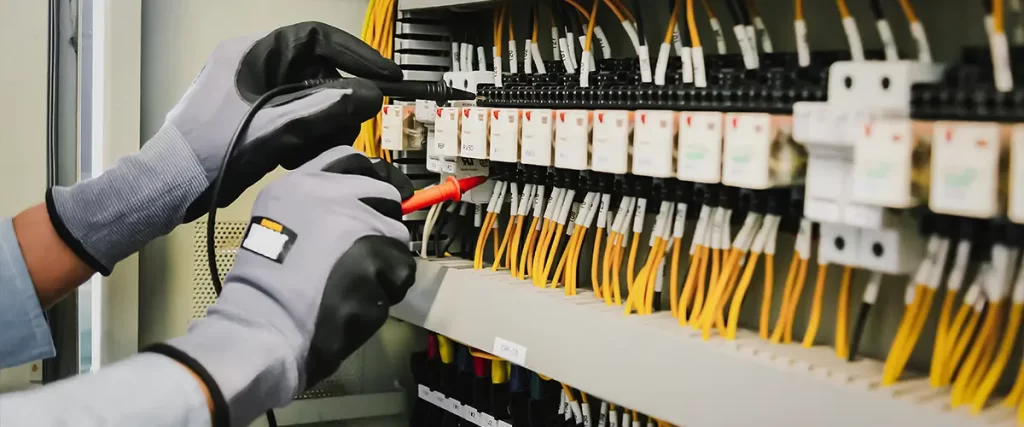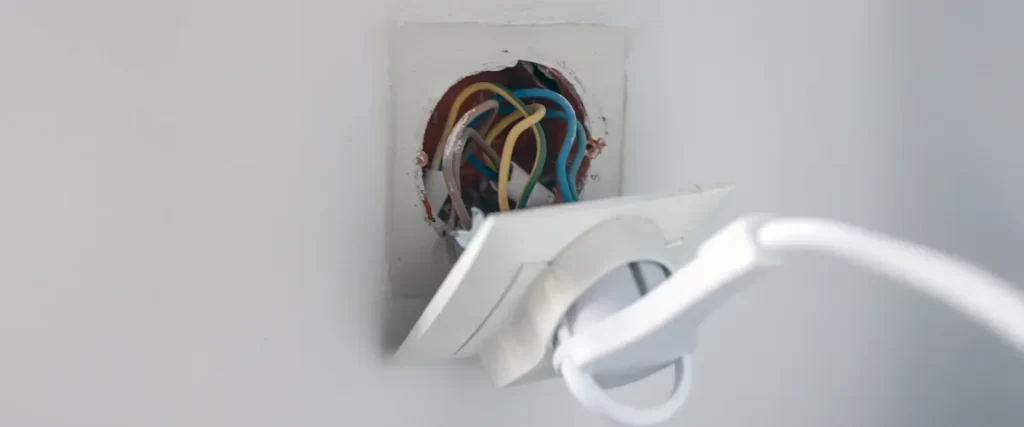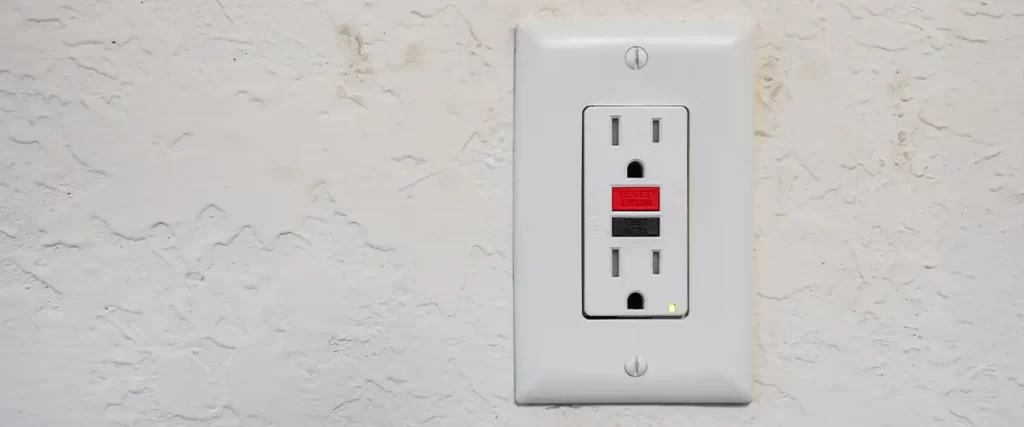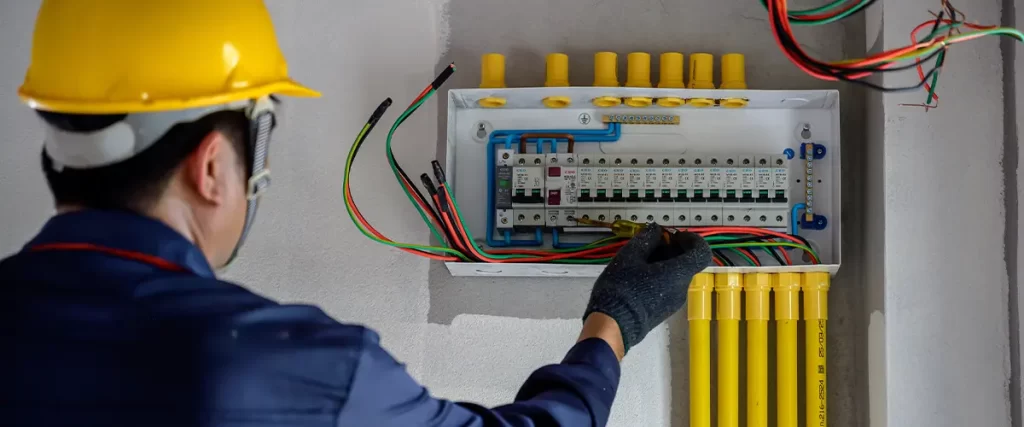Owning a historic home in Emmaus or Hellertown means preserving a piece of the past while ensuring modern safety and functionality. One of the most critical aspects of maintaining these homes is electrical safety. Many historic homes still rely on outdated wiring, ungrounded outlets, and older electrical panels, which can pose serious safety risks.
Regular electrical safety evaluations help homeowners identify potential hazards, ensure compliance with modern electrical codes, and prevent fire hazards caused by faulty or outdated wiring.

How Often Should You Schedule an Electrical Safety Evaluation?
The National Fire Protection Association (NFPA) and electrical safety experts recommend the following evaluation schedule for historic homes:
| Situation | Recommended Inspection Frequency |
| Homes Over 50 Years Old | Every 3-5 years |
| Homes Over 100 Years Old | Every 2-3 years |
| Before Buying a Historic Home | Required before purchase |
| After Major Renovations or Electrical Work | Immediately after completion |
| After Major Storms or Power Surges | As needed, especially if electrical damage is suspected |
If you experience flickering lights, frequently tripped breakers, or buzzing outlets, you should schedule an inspection immediately.
Common Electrical Issues in Historic Homes
Historic homes in Emmaus and Hellertown often feature electrical systems that were not designed to handle modern appliances and technology. Some of the most common issues include:
Outdated Wiring Systems
- Knob-and-Tube Wiring (Pre-1950s) – Not grounded, prone to overheating, and unsafe for modern use.
- Aluminum Wiring (1960s-1970s) – Can loosen over time and create fire hazards.
- Cloth-Insulated Wiring – Prone to deterioration, exposing bare wires.
Insufficient Electrical Panels
- Older homes often have 60-amp or 100-amp electrical panels, whereas modern homes require at least 200-amp service.
- Breakers frequently trip due to overloaded circuits.
- Fuse boxes may still be in use, which are outdated and unsafe.

Ungrounded Outlets & Two-Prong Receptacles
- Lack of proper grounding increases the risk of electrical shock and surges.
- Many historic homes do not have GFCI (Ground Fault Circuit Interrupter) outlets in kitchens, bathrooms, and outdoor areas.
Overloaded Circuits & Extension Cord Reliance
- Older wiring systems were not built to support multiple appliances, air conditioning, or high-energy devices.
- Heavy reliance on extension cords increases fire risks.
Benefits of Regular Electrical Safety Evaluations
Scheduling regular inspections can help protect your historic home, your family, and your investment.
Why Regular Inspections Are Essential:
Electrical fires are one of the top causes of home fires, and outdated wiring significantly increases the risk. Upgrading your wiring not only helps prevent fires but also improves energy efficiency by reducing energy waste, which can lower your utility bills.
Additionally, modernizing your electrical system ensures your home meets current safety codes, offering peace of mind and enhanced protection for you and your family.
Beyond safety, updated wiring can positively impact your home’s value. Many insurance providers require homes to have modern electrical systems to maintain coverage, making upgrades essential for compliance.
A well-maintained electrical system also boosts resale value and reassures potential buyers, giving them confidence in the safety and reliability of the property.
What Happens During an Electrical Safety Evaluation?
During a professional electrical safety inspection, an electrician will assess the following:
| Inspection Area | What’s Checked? |
| Wiring & Circuit Breakers | Identifies old, faulty, or overloaded wiring. |
| Outlets & Switches | Tests for proper grounding and functionality. |
| Electrical Panel | Ensures the panel can handle modern power needs. |
| Grounding & Bonding | Confirms the system is properly grounded to prevent shocks. |
| Smoke & Carbon Monoxide Detectors | Checks proper installation and function. |
| Surge Protection | Evaluates the need for whole-house surge protection. |
The electrician will then provide recommendations for upgrades or repairs to bring your home up to current safety standards.
Signs Your Historic Home Needs Immediate Electrical Upgrades
Even if your home hasn’t reached the next scheduled inspection date, these warning signs indicate an urgent need for an electrical evaluation:
- Frequent Circuit Breaker Trips – Indicates overloaded circuits or failing electrical panels.
- Flickering or Dimming Lights – Often caused by loose wiring or inadequate power supply.
- Burning Smell or Scorch Marks – Could signal faulty wiring or overheating outlets.
- Buzzing Sounds from Outlets or Switches – Indicates loose wiring or dangerous arcing.
- Warm or Discolored Outlets – A sign of overloaded circuits or unsafe connections.
- Two-Prong Outlets (No Grounding) – Lacks proper safety features to protect modern electronics.
If you notice any of these issues, schedule an electrical inspection immediately to prevent hazards.

Upgrading the Electrical System in a Historic Home
Making electrical upgrades in a historic home requires careful planning to maintain its original charm while ensuring modern safety and efficiency.
Recommended Electrical Upgrades:
Replacing knob-and-tube or aluminum wiring is essential for improving both the safety and energy efficiency of your home. Old wiring systems can pose significant fire hazards and struggle to meet modern electrical demands.
Upgrading to a 200-amp panel is a smart move to support today’s power needs. With more devices and appliances in use, a higher-capacity panel ensures your electrical system can handle the load.
Installing GFCI and AFCI outlets provides critical protection against electrical shocks and reduces the risk of electrical fires. These outlets are especially important in areas like kitchens, bathrooms, and bedrooms.
Adding whole-home surge protection safeguards your appliances and electronics from power surges, which can cause costly damage. It’s a simple step that offers peace of mind during storms or electrical fluctuations.
Rewiring attics and basements is often overlooked, but these areas typically have old or inadequate wiring that needs to be updated to ensure safety and reliability.
Finally, installing smart home technology allows you to safely integrate modern security systems, lighting controls, and other automated solutions, enhancing both convenience and safety in your home.
When upgrading, work with licensed electricians experienced in historic homes to ensure compliance with safety codes while preserving architectural integrity.
Best Manufacturers of Electrical and Smart Home Products
Choosing reliable manufacturers ensures quality and durability for electrical upgrades and smart home systems in historic homes.
- Leviton: Offers high-quality electrical components and smart home solutions with a focus on innovation and reliability.
- Lutron: Renowned for their smart lighting and shading systems, combining functionality with elegant designs.
- Schneider Electric: Specializes in energy management and automation products, ensuring efficiency and safety for your home.
- Honeywell: Provides comprehensive smart home solutions and safety devices tailored to modernize and secure historic properties.
- Eaton: Delivers durable electrical systems and automation solutions, emphasizing sustainability and energy efficiency.
Frequently Asked Questions
What services do you offer?
We specialize in electrical upgrades for older or historic homes, smart home system installations, and general safety inspections. Our goal is to make your home both safe and modern while respecting its original charm.
Can you work on old wiring systems?
Absolutely! We are experienced in updating old wiring systems to meet current safety standards. We’ll make sure everything is safe and up to code without compromising your home’s structure.
Do you install smart home technology?
Yes, we can help integrate smart security systems, automated lighting, and more into your home. We’ll guide you through the setup to ensure everything works seamlessly.
How long does a typical upgrade take?
This depends on the scope of the project, but most upgrades take anywhere from a few days to a couple of weeks. We’ll provide you with a detailed timeline after evaluating your home.
Will you help me get permits if I need them?
Yes, we’ll handle the permitting process for you. We’re familiar with local codes and regulations, so you won’t have to worry about the paperwork.
How do I know my home is up to code?
Our team conducts a thorough inspection and checks every detail to ensure that your home meets the latest safety codes. If there are any issues, we’ll explain what needs to be done to fix them.
Do you offer free estimates?
Definitely! We’ll assess your home and provide a free estimate so you can decide how you’d like to proceed without any pressure.
Why should I choose your company?
We have years of experience working with older homes, a proven track record of quality service, and a focus on customer satisfaction. Plus, we’ll work with you every step of the way to make sure you’re happy with the results.

Final Thoughts: Protecting Your Historic Home in Emmaus & Hellertown
Regular electrical safety evaluations are essential for keeping historic homes in Emmaus and Hellertown safe and up to code.
By scheduling inspections every 3-5 years (or sooner if needed) and addressing issues like outdated wiring, overloaded circuits, and improper grounding, you can prevent electrical fires, reduce energy waste, and maintain the historic charm of your home.
Our team has years of expertise delivering top-notch smart home solutions. Work with the best to ensure superior results and savings. Contact us at (610) 214-2179 to begin today!
